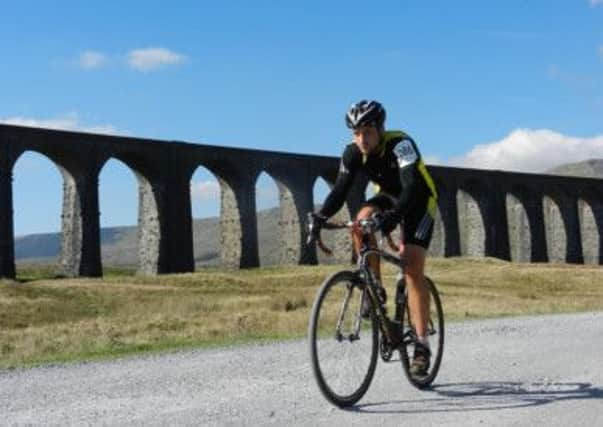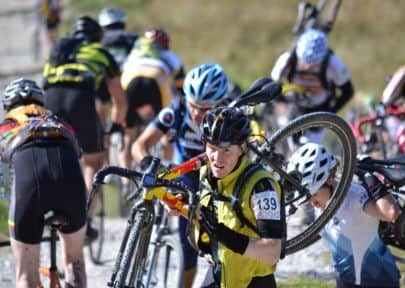Pedalling the Peaks


Without a doubt the Grand Départ was a feather in the cap for Yorkshire. There will no doubt be many lasting legacies of that July weekend, but one is already very visible – there are more people out riding their bikes than there ever was before the county wooed Tour de France organisers.
For those that followed the race when it left the UK, you may remember Lars Boom – he’s the chap that won the Ypres to Arenburg Porte du Hinaut Stage, which saw Chris Froome abandon the race. This stage dubbed “the Hell of the North” contained seven cobbled sections. Boom had the edge, because as the former World Cyclo-Cross Champion, he had the skills required to bunny hop the cobbles and win.
Advertisement
Hide AdAdvertisement
Hide AdCyclo-Cross is not a new sport; conceived in early 19th century France, it has from the onset been a popular participation as a well as a popular spectator sport in the traditional road cycling countries of Belgium, France and the Netherlands. Despite growing in popularity in the UK, it still tends to have a smaller following than road cycling. Nevertheless, with its emphasis on a rider’s aerobic endurance and bike handling skills, and with races and events for all ages taking place safely off the roads, it certainly has lots to recommend it.


The “jewel in the crown” of the British and indeed the international cyclo-cross calendar is next Sunday’s Three Peaks Cyclo-Cross. Entries are closed for this year, but the event will act as a showcase for the sport as nearly 650 of the UK and Europe’s foremost riders – cycle, run and carry their bikes over the 61km course.
Race organiser for over 50 years up to 2012, and winner of the very first race in 1961, John Rawnsley, from Bradford RCC jokingly describes the race as “a high speed cycle race with three mountains”. Soon after joining Bradford RCC in 1960, John was invited by the club to join a group who wanted to try and cycle the Three Peaks.
“Certain members of the club had been inspired by the story of a 14-year-old schoolboy called Kevin Watson who had been reported in the Yorkshire Evening Post as the first person ever to ‘cycle’ the Three Peaks. Kevin who was a keen cyclist and a school cross country star, had been motivated to attempt the feat after watching the Three Peaks running race earlier in the year. He first walked the route, mapping out possible tracks for cycling, and then completed it a week or two later in a record making five and half hours,” explains John.
Advertisement
Hide AdAdvertisement
Hide Ad“When we tackled the course in the October of that year we managed it in four hours, 31 minutes. We were then approached by Norman Thornber, who was a Three Peaks enthusiast and author of a book on the subject, who proposed to help us and donate a carved trophy – like he had for the running race – if we organised an official race. We tested a different route in May 1961 which transpired to be the route for the first few races. I said I’d be happy to organise it, as long as I could also compete in it – as it was definitely my kind of race.”
The Three Peaks Cyclo-Cross is very much an anomaly in the cyclo-cross calendar. Most cyclo-cross events take place on ‘man-made’ courses in locations such as Peel Park, Bradford or Myrtle Park in Bingley, and last about an hour. The record for this course held by Rob Jebb, who is also renowned as one of Britain’s premier fell runners, is a breath taking two hours, 52 minutes and 22 seconds. However, completing it in anything under five hours is considered good going.
The 61km course breaks down to 28km road racing and 33km racing on unsurfaced track. There is also around 6-8km – depending on the prevailing weather conditions – which is un-rideable, demanding racers to push their bikes, and when that becomes impossible – to carry them. Add to that a total climb of 1,524m over all of the three peaks, and one really starts to comprehend the gruelling physical challenge that the race presents.
Due to the extreme nature of the course, riders must use an appropriate cyclo-cross bike, which although looking very similar to a road bike has certain key differences, most notably: knobbled tread on the tyres for grip, powerful brakes, lower gears, and better frame clearances to prevent mud clogging.
Advertisement
Hide AdAdvertisement
Hide AdTaking all this into consideration, it’s surely no surprise then that the race attracts elite cyclo-cross riders, as well as triathletes, fell runners and adventure racers from across the UK and Europe. Indeed, tomorrow’s race will see Christian Heule, the six times Swiss National Cyclo-Cross Champion, take his place in the race for the very first time.
“On paper Christian should be a contender, but he’s never ridden the race before which does place him at a disadvantage, particularly to someone like Jebb, who won it for the tenth time last year. It will all boil down to his ability to run and climb, as this is where Jebb excels.”
The race will without doubt be an exhilarating spectacle to watch, and due to its length offers a variety of consecutive vantage points. Official race commentator Roger Ingham, widely known as Skipton’s ‘Mr Sport’, advocates the use of a bike in getting around the course to catch the leaders on some of the many exciting sections:
“The start of the race at Helwith Bridge is of course rousing, but if you feel you can forego that, you can get in position to catch the riders at the first big climb of the race, which is the ascent up Simon Fell adjacent to Ingleborough. This is one of the hardest parts of the race as the gradient soon becomes about 45 degrees. Riders have no option but to push and then carry their bikes. Some of the leaders will start to break away from the pack here as they tend to be the ones who can run whilst carrying their bikes uphill,” explains Roger.
Advertisement
Hide AdAdvertisement
Hide Ad“Another good place to ride out to ahead of the race is Chapel le Dale, to catch the riders before they start their ascent up Whernside – which will be another gruelling push and carry to the summit. Coming off Whernside, down to Blea Moor is exciting for spectators as this is a very difficult descent as riders are racing across slabs of stone with drainage gullies in-between, which requires a lot of skill and care.”
If you are in a car, then watching the start and then driving out to Ribblehead works well – this is one of the fastest sections, and means you can catch them coming off Whernside too, though you will find that the riders are quite spread out by then. An even faster section takes place between Ribblehead and Horton in Ribblesdale before the riders start their climb up Pen-y-ghent.
“Then, once around the summit – it is hell for leather back down the mountain, with a sprint return to the finish and hopefully Three Peaks glory!”
Despite the fact that John feels that Jebb’s record set in 2008 will be hard to break, there are many other records worth monitoring this year. The women’s record of three hours and 39 minutes set in 2003 is held by Louise Robinson, daughter of Brian Robinson – the first British man to win a stage of the Tour de France in 1958 – is also a strong record and will prove challenging to beat. However one of the veteran records looks like it could be compromised, as six times winner Tim Gould takes to the slopes again having just turned 50. Another race stalwart worth looking out for is John Dowell who will be riding his 24th race this year, finishing the race last year in five hours and 20 minutes at the grand age of 78.
Advertisement
Hide AdAdvertisement
Hide Ad“It’s the combination of gradient, terrain and weather which gives the Three Peaks their reputation,” reflects John. “In 2012 we saw the riders lined up at the start in torrential rain, low cloud and gale force winds, and it remained like that for the whole race. They were battling against the course and battling against the elements. Races like that don’t happen very often thankfully, but when they do they really highlight the skill of the cross-riders, and reveal their remarkable resolve.”
The Three Peaks Cyclo Cross starts on Sunday, September 26 at 9.30am in Helwith Bridge.
• For more information about the race please see www.3peakscyclocross.org.uk. For more information about cyclo-cross in Yorkshire and how to get involved please see; yorkshirecyclocross.com.